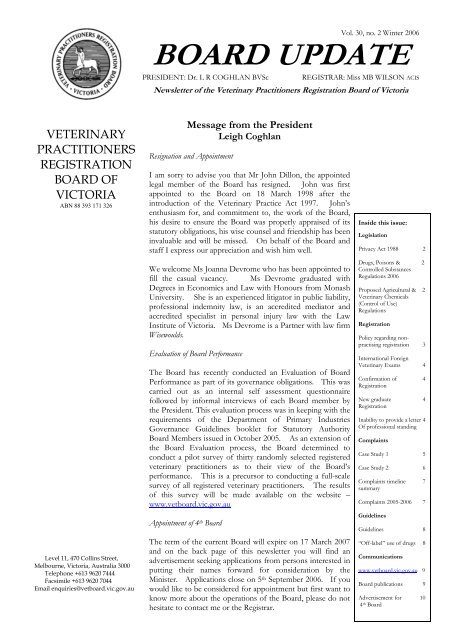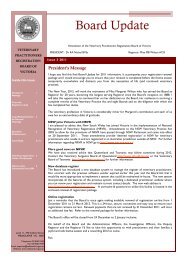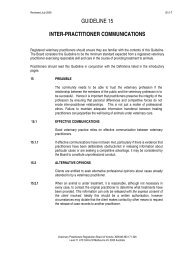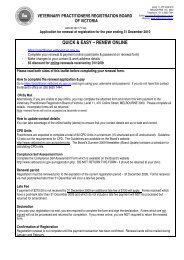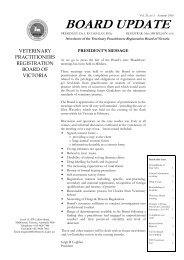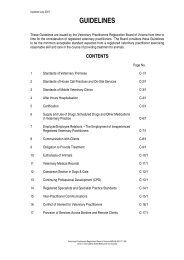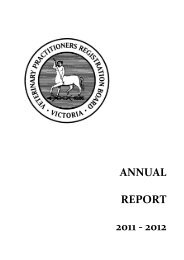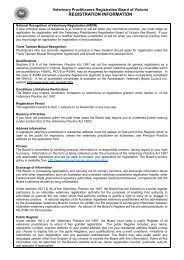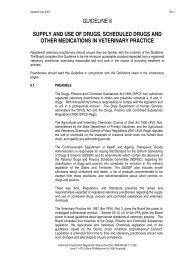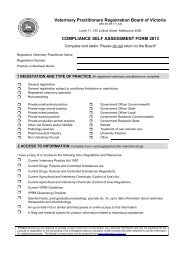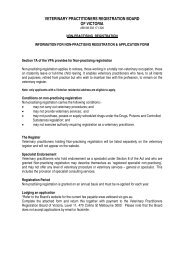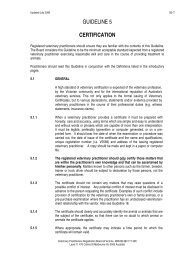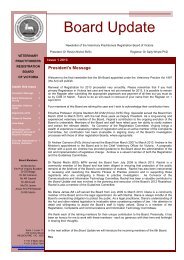board update - Veterinary Practitioners Registration Board of Victoria
board update - Veterinary Practitioners Registration Board of Victoria
board update - Veterinary Practitioners Registration Board of Victoria
You also want an ePaper? Increase the reach of your titles
YUMPU automatically turns print PDFs into web optimized ePapers that Google loves.
Vol. 30, no. 2 Winter 2006<br />
BOARD UPDATE<br />
PRESIDENT: Dr. L R COGHLAN BVSc<br />
REGISTRAR: Miss MB WILSON ACIS<br />
Newsletter <strong>of</strong> the <strong>Veterinary</strong> <strong>Practitioners</strong> <strong>Registration</strong> <strong>Board</strong> <strong>of</strong> <strong>Victoria</strong><br />
VETERINARY<br />
PRACTITIONERS<br />
REGISTRATION<br />
BOARD OF<br />
VICTORIA<br />
ABN 88 393 171 326<br />
Level 11, 470 Collins Street,<br />
Melbourne, <strong>Victoria</strong>, Australia 3000<br />
Telephone +613 9620 7444<br />
Facsimile +613 9620 7044<br />
Email enquiries@vet<strong>board</strong>.vic.gov.au<br />
Message from the President<br />
Leigh Coghlan<br />
Resignation and Appointment<br />
I am sorry to advise you that Mr John Dillon, the appointed<br />
legal member <strong>of</strong> the <strong>Board</strong> has resigned. John was first<br />
appointed to the <strong>Board</strong> on 18 March 1998 after the<br />
introduction <strong>of</strong> the <strong>Veterinary</strong> Practice Act 1997. John’s<br />
enthusiasm for, and commitment to, the work <strong>of</strong> the <strong>Board</strong>,<br />
his desire to ensure the <strong>Board</strong> was properly appraised <strong>of</strong> its<br />
statutory obligations, his wise counsel and friendship has been<br />
invaluable and will be missed. On behalf <strong>of</strong> the <strong>Board</strong> and<br />
staff I express our appreciation and wish him well.<br />
We welcome Ms Joanna Devrome who has been appointed to<br />
fill the casual vacancy. Ms Devrome graduated with<br />
Degrees in Economics and Law with Honours from Monash<br />
University. She is an experienced litigator in public liability,<br />
pr<strong>of</strong>essional indemnity law, is an accredited mediator and<br />
accredited specialist in personal injury law with the Law<br />
Institute <strong>of</strong> <strong>Victoria</strong>. Ms Devrome is a Partner with law firm<br />
Wisewoulds.<br />
Evaluation <strong>of</strong> <strong>Board</strong> Performance<br />
The <strong>Board</strong> has recently conducted an Evaluation <strong>of</strong> <strong>Board</strong><br />
Performance as part <strong>of</strong> its governance obligations. This was<br />
carried out as an internal self assessment questionnaire<br />
followed by informal interviews <strong>of</strong> each <strong>Board</strong> member by<br />
the President. This evaluation process was in keeping with the<br />
requirements <strong>of</strong> the Department <strong>of</strong> Primary Industries<br />
Governance Guidelines booklet for Statutory Authority<br />
<strong>Board</strong> Members issued in October 2005. As an extension <strong>of</strong><br />
the <strong>Board</strong> Evaluation process, the <strong>Board</strong> determined to<br />
conduct a pilot survey <strong>of</strong> thirty randomly selected registered<br />
veterinary practitioners as to their view <strong>of</strong> the <strong>Board</strong>’s<br />
performance. This is a precursor to conducting a full-scale<br />
survey <strong>of</strong> all registered veterinary practitioners. The results<br />
<strong>of</strong> this survey will be made available on the website –<br />
www.vet<strong>board</strong>.vic.gov.au<br />
Appointment <strong>of</strong> 4 th <strong>Board</strong><br />
The term <strong>of</strong> the current <strong>Board</strong> will expire on 17 March 2007<br />
and on the back page <strong>of</strong> this newsletter you will find an<br />
advertisement seeking applications from persons interested in<br />
putting their names forward for consideration by the<br />
Minister. Applications close on 5 th September 2006. If you<br />
would like to be considered for appointment but first want to<br />
know more about the operations <strong>of</strong> the <strong>Board</strong>, please do not<br />
hesitate to contact me or the Registrar.<br />
Inside this issue:<br />
Legislation<br />
Privacy Act 1988 2<br />
Drugs, Poisons & 2<br />
Controlled Substances<br />
Regulations 2006<br />
Proposed Agricultural & 2<br />
<strong>Veterinary</strong> Chemicals<br />
(Control <strong>of</strong> Use)<br />
Regulations<br />
<strong>Registration</strong><br />
Policy regarding nonpractising<br />
registration 3<br />
International Foreign<br />
<strong>Veterinary</strong> Exams 4<br />
Confirmation <strong>of</strong> 4<br />
<strong>Registration</strong><br />
New graduate 4<br />
<strong>Registration</strong><br />
Inability to provide a letter 4<br />
Of pr<strong>of</strong>essional standing<br />
Complaints<br />
Case Study 1 5<br />
Case Study 2 6<br />
Complaints timeline 7<br />
summary<br />
Complaints 2005-2006 7<br />
Guidelines<br />
Guidelines 8<br />
“Off-label” use <strong>of</strong> drugs 8<br />
Communications<br />
www.vet<strong>board</strong>.vic.gov.au 9<br />
<strong>Board</strong> publications 9<br />
Advertisement for 10<br />
4 th <strong>Board</strong>
PRIVACY ACT 1988 (COMMONWEALTH)<br />
The Privacy Act 1988 (Commonwealth) is<br />
the legislation affecting privacy matters in<br />
private sector organisations. The following<br />
section from Guidelines to the National Privacy<br />
Principles issued by the Office <strong>of</strong> the Federal<br />
Privacy Commissioner in September 2001<br />
needs to be noted by veterinary practices:<br />
“The new privacy provisions will apply to<br />
businesses (including non-pr<strong>of</strong>it<br />
organisations) with an annual turn-<br />
over <strong>of</strong> more than $3 million and<br />
health service providers.<br />
Businesses with an annual turnover <strong>of</strong> $3<br />
million or less are exempt from the new<br />
laws unless one <strong>of</strong> the following statements is<br />
true for the business:<br />
• It is related to another business (for<br />
example its holding company or a<br />
subsidiary) that has an annual<br />
turnover <strong>of</strong> more than $3 million<br />
• It provides a health service and holds<br />
health records<br />
• It discloses personal information for a<br />
benefit service or advantage<br />
• It provides someone else with a<br />
benefit, service or advantage to<br />
collect personal information<br />
• It is a contracted service provider for<br />
a Commonwealth contract”<br />
In the majority <strong>of</strong> cases veterinary<br />
practices in <strong>Victoria</strong> are exempt from the<br />
Privacy Act 1988 as they do not provide<br />
health services as defined in the legislation<br />
and the annual turn-over is less than $3<br />
million, therefore practitioners cannot<br />
refuse to provide medical records by citing<br />
the Privacy Act 1988.<br />
Further information regarding the Privacy<br />
Act 1988 (Commonwealth) can be<br />
obtained from their website<br />
www.privacy.gov.au where they provide<br />
guidelines, information sheets and other<br />
relevant documentation.<br />
DRUGS, POISONS AND CONTROLLED SUBSTANCES REGULATIONS<br />
2006<br />
The new Drugs, Poisons and Controlled<br />
Substances Regulations 2006 were authorised on<br />
25 May 2006 and revoke all previous<br />
regulations <strong>of</strong> the Drugs, Poisons and Controlled<br />
Substances Act 1981. They can be<br />
downloaded from the web at the following:<br />
www.dms.dpc.vic.gov.au under Statutory<br />
Rules as either a PDF document or Word<br />
file, or can be purchased in hard copy from<br />
Information <strong>Victoria</strong>, 356 Collins St<br />
Melbourne 3000, telephone 1300 366 356,<br />
fax (03) 9603 9920.<br />
PROPOSED AGRICULTURAL AND VETERINARY CHEMICALS<br />
(CONTROL OF USE) REGULATIONS 2006<br />
The <strong>Board</strong> was requested to comment on the<br />
proposed Agricultural and <strong>Veterinary</strong><br />
Chemicals (Control <strong>of</strong> Use) Regulations<br />
2006. The <strong>Board</strong> supports the continuance<br />
<strong>of</strong> regulations providing for the control <strong>of</strong><br />
use <strong>of</strong> agricultural and veterinary chemicals<br />
and confined its comments to proposed<br />
Regulation 10: “10 Advice notes<br />
An advice note prepared by a veterinary practitioner<br />
in connection with the treatment <strong>of</strong> a stock animal<br />
with a veterinary chemical product must be supplieda)<br />
in person to the person responsible for the<br />
management <strong>of</strong> the animal before treatment <strong>of</strong> the<br />
animal using the product commences or at the time <strong>of</strong><br />
initial treatment; or<br />
b) by facsimile to the person responsible for the<br />
management <strong>of</strong> the animal before treatment <strong>of</strong> the<br />
animal using the product commences.”<br />
As there appeared to be a contradiction in<br />
the Regulation, in that on the one hand<br />
the practitioner must provide the advice<br />
note in person, and on the other may<br />
send it by facsimile, the <strong>Board</strong> requested<br />
deletion <strong>of</strong> the words “in person”. This<br />
would ensure continuance <strong>of</strong> the spirit <strong>of</strong><br />
the Regulation – that the veterinary<br />
practitioner has a legal responsibility to<br />
provide a written advice note to the<br />
person responsible for the animal, but<br />
removes the legal requirement to be<br />
physically present when the<br />
documentation is handed over.<br />
Page 2 <strong>of</strong> 10
BOARD UPDATE VOL. 30, no 2 Winter 2006<br />
POLICY REGARDING NON-PRACTISING REGISTRATION<br />
Section 7A <strong>of</strong> the <strong>Veterinary</strong> Practice Act<br />
1997 provides for non-practising<br />
registration:<br />
“7A.Non-practising registration<br />
(1) The <strong>Board</strong> may grant or refuse to grant<br />
registration as a non-practising veterinary<br />
practitioner to an applicant if the applicant –<br />
(a) is qualified for general registration; and<br />
(b) the applicant has satisfied the <strong>Board</strong> that<br />
he or she does not intend to practice as a<br />
veterinary practitioner for the period <strong>of</strong> the<br />
registration<br />
(2) A grant <strong>of</strong> non-practising registration<br />
under this section is subject to any conditions,<br />
limitations or restrictions imposed by the <strong>Board</strong><br />
on the registration.<br />
(3) The <strong>Board</strong> may, <strong>of</strong> its own motion, or on<br />
the application by a veterinary practitioner<br />
granted registration as a non-practising<br />
veterinary practitioner, amend, vary or revoke<br />
any condition, limitation, or restriction<br />
imposed under sub-section (2).”<br />
Non-practising registration applies to<br />
retirees, those working in a totally nonveterinary<br />
occupation, those on maternity<br />
leave or full-time child rearing and those<br />
working overseas or interstate. It enables<br />
veterinary practitioners who have, to all<br />
intents and purposes, retired from practice<br />
but who wish to maintain ties with the<br />
pr<strong>of</strong>ession, to remain on the veterinary<br />
register.<br />
To be eligible for non-practising registration<br />
the veterinary practitioner:<br />
• may not carry out veterinary<br />
procedures in <strong>Victoria</strong>; and<br />
• may not provide veterinary services<br />
in <strong>Victoria</strong>; and<br />
• may not exercise authority requiring<br />
registration as a veterinary<br />
practitioner in <strong>Victoria</strong>.<br />
Therefore, holders <strong>of</strong> non-practising<br />
registration may not consult, provide<br />
certificates <strong>of</strong> any type, nor purchase,<br />
possess or supply scheduled drugs under the<br />
Drugs and Poisons legislation in <strong>Victoria</strong>.<br />
Applicants for non-practising registration<br />
must sign a declaration that they meet the<br />
eligibility requirements as follows:<br />
“I do not intend to practise as a veterinary<br />
practitioner: that is, I will not carry out procedures,<br />
provide services or exercise authority requiring<br />
registration as a veterinary practitioner, during the<br />
registration period applied for.”<br />
Non-practising registration is granted on<br />
an annual basis and must be re-applied for<br />
each year.<br />
<strong>Veterinary</strong> practitioners holding nonpractising<br />
registration will be listed<br />
separately on the veterinary register and<br />
will not be included in the database posted<br />
on the <strong>Board</strong>’s website.<br />
<strong>Veterinary</strong> practitioners who hold<br />
endorsement as a specialist under section 8<br />
<strong>of</strong> the Act and who are granted nonpractising<br />
registration may describe<br />
themselves as ‘registered specialist nonpractising’,<br />
and may not <strong>of</strong>fer any level <strong>of</strong><br />
veterinary procedure or veterinary services<br />
– general or specialist. This includes the<br />
provision <strong>of</strong> specialist consulting services.<br />
For those practitioners holding Nonpractising<br />
<strong>Registration</strong> who wish to apply<br />
for General <strong>Registration</strong> the following<br />
applies:<br />
a) applicants who have held nonpractising<br />
registration for less than<br />
three years are able to have their nonpractising<br />
registration converted to full<br />
registration up until the end <strong>of</strong> the<br />
deeming period by completing a<br />
renewal form and paying the renewal<br />
fee minus the non-practising fee<br />
already paid with the amount to be<br />
paid dependant upon the date the<br />
original payment was made<br />
b) applicants who have held nonpractising<br />
registration for less than<br />
three years who wish to convert to full<br />
general registration after the deeming<br />
period are required to complete a<br />
general registration form and pay the<br />
general registration fee<br />
c) applicants who have held nonpractising<br />
registration for over three<br />
years and who have not been practising<br />
elsewhere may be assessed for<br />
competency in practise.<br />
The registration fee for non-practising<br />
registration has been set at $36.00. This is<br />
a flat rate fee and no late, restoration or<br />
penalty fees apply.<br />
Page 3 <strong>of</strong> 10
INTERNATIONAL FOREIGN VETERINARY EXAMINATIONS<br />
Following recommendations from the Australasian<br />
<strong>Veterinary</strong> <strong>Board</strong>s Council Inc (AVBC) the <strong>Board</strong><br />
now recognises a number <strong>of</strong> foreign examinations<br />
for foreign veterinary graduates as equivalent to the<br />
Australian National <strong>Veterinary</strong> Examination<br />
(NVE) for the purposes <strong>of</strong> gaining general<br />
registration in <strong>Victoria</strong>.<br />
The New Zealand National <strong>Veterinary</strong><br />
Examination (NZNVE) is recognised as equivalent<br />
to the NVE, therefore holders <strong>of</strong> this qualification<br />
can gain general registration in <strong>Victoria</strong>. The<br />
Educational Commission for Foreign <strong>Veterinary</strong><br />
Graduates (ECFVG) awarded in the United States<br />
is also recognised as equivalent to the NVE, as is<br />
the Canadian National Examination <strong>Board</strong> (NEB)<br />
examination for foreign veterinary graduates.<br />
Holders <strong>of</strong> these qualifications can now apply for<br />
general registration in <strong>Victoria</strong> without further<br />
examination. However applicants will be required<br />
to have an interview with the Registrar before<br />
registration is granted in order to ascertain<br />
knowledge <strong>of</strong> <strong>Victoria</strong>n legislation relevant to the<br />
veterinary pr<strong>of</strong>ession, and their standard <strong>of</strong> the<br />
English language.<br />
CONFIRMATION OF REGISTRATION<br />
All registration, including restoration and reregistration,<br />
applications will not be put forward to<br />
the <strong>Board</strong> until advice has been received from the<br />
bank that payment <strong>of</strong> the fee has been honoured.<br />
Consequently applications will need to be received<br />
at least a week before the sitting <strong>of</strong> the <strong>Board</strong>.<br />
Confirmation <strong>of</strong> registration will now be a two<br />
step process where payment requires to be<br />
honoured before the application in put to the<br />
<strong>Board</strong> and if the <strong>Board</strong> accepts the application the<br />
applicant will be notified in writing that<br />
registration is confirmed.<br />
NEW GRADUATE REGISTRATION<br />
New graduate registration is available to those new<br />
graduates who have not been previously registered<br />
elsewhere and within twelve months <strong>of</strong> graduation.<br />
New graduates are required to complete a new<br />
graduate registration form and provide a certified<br />
copy <strong>of</strong> their degree with payment <strong>of</strong> the<br />
registration fee.<br />
After twelve months since graduation applicants<br />
are no longer considered to be new graduates,<br />
even though they have not been registered<br />
elsewhere. Such applicants are required to<br />
complete a <strong>Registration</strong> form, provide a certified<br />
copy <strong>of</strong> their degree, a detailed CV describing<br />
pr<strong>of</strong>essional activities since graduation with<br />
payment <strong>of</strong> the registration fee. The application<br />
will be brought to the <strong>Board</strong>’s attention at the<br />
relevant <strong>Board</strong> meeting.<br />
INABILITY TO PROVIDE A LETTER OF PROFESSIONAL STANDING<br />
It has come to the <strong>Board</strong>’s attention that some<br />
applicants have been unable to provide the <strong>Board</strong><br />
with a letter <strong>of</strong> pr<strong>of</strong>essional standing. In the<br />
following cases alternative have been agreed upon:<br />
1. Residency program: for those who have<br />
been enrolled in a residency program<br />
pro<strong>of</strong> must be provided <strong>of</strong> being or having<br />
been enrolled in a residency program, sent<br />
directly to the <strong>Board</strong> from the university<br />
where the residency program is situated<br />
stating the full name <strong>of</strong> the applicant, the<br />
type <strong>of</strong> program, the length <strong>of</strong> the<br />
program, the fact that<br />
registration/licensing was not required and<br />
that there was no incidence <strong>of</strong><br />
unpr<strong>of</strong>essional conduct.<br />
2. No registering authority: for those who<br />
have been working in a jurisdiction where<br />
there was no registering authority a letter<br />
must be provided from their employer/s<br />
(voluntary or otherwise) directly to the<br />
<strong>Board</strong> stating the full name <strong>of</strong> the<br />
applicant, the type <strong>of</strong> work the applicant<br />
was undertaking, the period <strong>of</strong> time<br />
employed and the fact no registering<br />
authority exists in the jurisdiction<br />
therefore registration was not required.<br />
3. As 2 above but unable to provide a letter<br />
from the employer: the applicant must<br />
provide a statutory declaration stating<br />
where the work was situated, the type <strong>of</strong><br />
work undertaken, the length <strong>of</strong> time the<br />
work was undertaken and why<br />
registration was not required.<br />
Page 4 <strong>of</strong> 10
BOARD UPDATE VOL. 30, no 2 Winter 2006<br />
COMPLAINTS<br />
Case Study 1<br />
A 10 year old cat was presented to Dr Z<br />
for dental prophylaxis. Dr Z was<br />
informed by the owner <strong>of</strong> the cat’s<br />
history <strong>of</strong> asthma. Dr Z performed a<br />
clinical examination <strong>of</strong> the cat which<br />
revealed no abnormalities. The owners<br />
were present for the majority <strong>of</strong> the<br />
dental prophylaxis. The cat was inducted<br />
with Aquafol®, intubated and maintained<br />
on is<strong>of</strong>lurane gaseous anaesthesia<br />
throughout the procedure. After the<br />
procedure, whilst still intubated, the cat<br />
ceased breathing. Efforts were made to<br />
resuscitate; however the cat was unable to<br />
be revived.<br />
The matter was referred to an Informal<br />
Hearing into the pr<strong>of</strong>essional conduct <strong>of</strong><br />
Dr Z. It was alleged that Dr Z engaged<br />
in unpr<strong>of</strong>essional conduct in that Dr Z<br />
did not obtain written consent for a<br />
procedure as required by Guideline 8.4.<br />
It was further alleged that Dr Z engaged<br />
in unpr<strong>of</strong>essional conduct in that Dr Z<br />
did not <strong>of</strong>fer a post-mortem as required<br />
by Guideline 16.4.1.<br />
In relation to the first allegation regarding<br />
consent, the <strong>Board</strong> found that Dr Z had<br />
not engaged in unpr<strong>of</strong>essional conduct.<br />
The <strong>Board</strong> deemed that the veterinary<br />
treatment provided by Dr Z was<br />
appropriate and <strong>of</strong> a satisfactory standard.<br />
The <strong>Board</strong> noted that clinical examination<br />
<strong>of</strong> the cat revealed no abnormalities on<br />
the day and the anaesthetic regime used<br />
was an appropriate choice for a cat <strong>of</strong><br />
such age and clinical history. The <strong>Board</strong><br />
could not determine the cause <strong>of</strong> death as<br />
no post mortem was performed. The<br />
<strong>Board</strong> noted that unexpected and<br />
unexplained deaths relating to an<br />
anaesthetic or surgical procedure do<br />
occasionally occur in veterinary practice.<br />
In this case, the death was an unfortunate<br />
but unforeseeable event.<br />
Whilst Dr Z admitted written consent<br />
was not obtained for the procedure, the<br />
<strong>Board</strong> considered that the presence <strong>of</strong><br />
the owners as witnesses to the<br />
procedure, constituted their consent.<br />
The owners informed the <strong>Board</strong> that at<br />
the time <strong>of</strong> the procedure they were<br />
aware <strong>of</strong> the possible risks and<br />
complications <strong>of</strong> anaesthesia. Therefore<br />
the <strong>Board</strong> considered that the consent<br />
was informed.<br />
The <strong>Board</strong> noted that Dr Z has since<br />
implemented the mandatory use <strong>of</strong><br />
written consent forms to record<br />
informed consent.<br />
In relation to the second allegation<br />
regarding post<br />
mortem, the <strong>Board</strong> found Dr Z had<br />
engaged in unpr<strong>of</strong>essional conduct and<br />
was counselled as follows:<br />
• In the event <strong>of</strong> the<br />
unexplained/unexpected<br />
death <strong>of</strong> an animal whilst<br />
under the care <strong>of</strong> a veterinary<br />
practitioner, the practitioner<br />
should <strong>of</strong>fer the owner the<br />
option <strong>of</strong> a post mortem,<br />
which may provide<br />
information regarding the<br />
cause <strong>of</strong> death, as required by<br />
and in compliance with<br />
Guideline 16.4.<br />
The <strong>Board</strong> found that a post mortem<br />
was not <strong>of</strong>fered in an attempt to<br />
establish cause <strong>of</strong> death. The <strong>Board</strong><br />
acknowledged the traumatic nature <strong>of</strong><br />
the event and understood Dr Z’s<br />
reticence to add to the owner’s distress.<br />
However, the <strong>Board</strong> deemed that in<br />
order to comply with Guideline 16.4, a<br />
post mortem should have been <strong>of</strong>fered.<br />
Page 5 <strong>of</strong> 10
Case Study 2<br />
A 3 year old dog was presented to Dr K for<br />
pregnancy diagnosis. Dr K was unable to confirm<br />
pregnancy through physical examination and<br />
referred the dog for abdominal ultrasound. An<br />
ultrasound examination revealed the presence <strong>of</strong> at<br />
least six pups. An appointment was subsequently<br />
made for the dog to undergo an elective caesarean<br />
section on a date close to that <strong>of</strong> the calculated<br />
whelping date.<br />
Dr K later examined the dog and based on the<br />
clinical findings; believed the dog was approaching<br />
natural parturition. An elective caesarean section<br />
was undertaken by Dr K. Six puppies were<br />
delivered alive; however no viable puppies survived<br />
despite efforts to resuscitate. One <strong>of</strong> the puppies<br />
was born with no hind limbs. Another had an<br />
umbilical hernia <strong>of</strong> which the origin is unclear.<br />
These two puppies were subsequently euthanised.<br />
No oxytocin was administered to the dog in the post<br />
surgical period as none was available in the clinic.<br />
Dr K advised the owner to be cautious breeding<br />
with the dog again due to the incidence <strong>of</strong> genetic<br />
abnormality. Six days post surgery, the dog naturally<br />
delivered a further two puppies at home. One was<br />
found dead in the garden and one has survived.<br />
During the natural delivery the dog herniated the<br />
surgical wound.<br />
The matter was referred to an Informal Hearing into<br />
the pr<strong>of</strong>essional conduct <strong>of</strong> Dr K. It was alleged<br />
that Dr K engaged in unpr<strong>of</strong>essional conduct in that<br />
Dr K failed to complete a caesarian section with due<br />
care, resulting in the retention <strong>of</strong> two puppies. It<br />
was further alleged that Dr K engaged in<br />
unpr<strong>of</strong>essional conduct in that Dr K failed to use an<br />
appropriate anaesthetic regime, as required by<br />
Guideline 12.2 and this may have contributed to<br />
foetal depression and the subsequent death <strong>of</strong> the<br />
neonates. The final allegation was that Dr K<br />
engaged in unpr<strong>of</strong>essional conduct in that Dr K may<br />
have misdiagnosed the neonatal mortalities as being<br />
due to genetic abnormality.<br />
In relation to the first allegation Dr K was found to<br />
have engaged in unpr<strong>of</strong>essional conduct, and was<br />
cautioned. A caution is a formal notification, in the<br />
context <strong>of</strong> an advisory warning, to a registered<br />
veterinary practitioner. It warns the registered<br />
veterinary practitioner that a change in his or her<br />
manner <strong>of</strong> practice is required in order to conform<br />
to the minimum standards <strong>of</strong> the pr<strong>of</strong>ession as<br />
dictated by the requirements <strong>of</strong> the <strong>Veterinary</strong><br />
Practice legislation, or by ancillary legislation (e.g.<br />
Drugs, Poisons and Controlled Substances<br />
legislation), or by the written Guidelines <strong>of</strong> the <strong>Board</strong>,<br />
or by the commonly understood community standards<br />
and those <strong>of</strong> the veterinary practitioner's peers. It<br />
becomes a matter <strong>of</strong> permanent record on the<br />
veterinary practitioner's file and may be referred to in<br />
any future Hearing or action taken by the <strong>Board</strong>.<br />
The <strong>Board</strong> determined that Dr K be cautioned to<br />
change such manner <strong>of</strong> practice in order to conform<br />
to the minimum standards <strong>of</strong> the pr<strong>of</strong>ession as<br />
dictated by the requirements <strong>of</strong> the <strong>Veterinary</strong> Practice<br />
Act 1997, and was further instructed to undertake<br />
further private study on the use <strong>of</strong> oxytocin.<br />
The <strong>Board</strong> accepted that the decision to proceed with<br />
the caesarean section was made in good judgement<br />
based on clinical findings indicating that parturition<br />
was imminent. However both Dr K and the <strong>Board</strong><br />
agreed that the surgery was not carried out with due<br />
care, resulting in the retention <strong>of</strong> two puppies. The<br />
<strong>Board</strong> found that Dr K failed to adequately inspect<br />
the uterus before completing the surgery and thus<br />
overlooked the remaining two puppies. The <strong>Board</strong><br />
considered checking the uterus before closing the<br />
surgical incision to be a basic principle <strong>of</strong> caesarean<br />
surgery and that failure to do so was unacceptable<br />
veterinary practice. As such the <strong>Board</strong> determined that<br />
Dr K did not exercise reasonable skill and care as is<br />
expected <strong>of</strong> a registered veterinary practitioner.<br />
The <strong>Board</strong> also believed that the failure to administer<br />
oxytocin may have contributed to the unfortunate<br />
outcome. The <strong>Board</strong> considered that had oxytocin<br />
been administered it may have aided uterine<br />
contractions and resulted in the delivery <strong>of</strong> the further<br />
two puppies in the period before the dog was<br />
discharged home. The <strong>Board</strong> understood that no<br />
oxytocin was available in the clinic but believed that<br />
an alternative source should have been sought. The<br />
<strong>Board</strong> advised that in most cases, even those without<br />
complications, the use <strong>of</strong> oxytocin may be beneficial<br />
after whelping.<br />
The <strong>Board</strong> questioned Dr K on the choice <strong>of</strong> suture<br />
technique. The <strong>Board</strong> advised that Dr K consider the<br />
use <strong>of</strong> a simple interrupted suture pattern rather than a<br />
simple continuous pattern in cases where undue stress<br />
may be placed on the incision site.<br />
The <strong>Board</strong> noted that as a result <strong>of</strong> this event Dr K<br />
has made changes in surgical preparation and<br />
technique. The <strong>Board</strong> further noted that Dr K is<br />
undertaking further studies in surgery.<br />
In relation to the second allegation Dr K was found<br />
not to have engaged in unpr<strong>of</strong>essional conduct.<br />
Page 6 <strong>of</strong> 10
BOARD UPDATE VOL. 30, no 2 Winter 2006<br />
The <strong>Board</strong> read extracts <strong>of</strong> current and reputable<br />
references provided by Dr K, which indicated the<br />
anaesthetic regime used fell within the range <strong>of</strong><br />
those recommended by such references. Whilst the<br />
<strong>Board</strong> considered that it was possible that Dr K’s<br />
choice <strong>of</strong> anaesthetic regime may have contributed<br />
to foetal depression and the subsequent death <strong>of</strong> the<br />
puppies, this could not be ascertained with the<br />
evidence provided. The <strong>Board</strong> noted that as a result<br />
<strong>of</strong> this event Dr K has revised particular anaesthetic<br />
protocols.<br />
In relation to the final allegation Dr K was found to<br />
have engaged in unpr<strong>of</strong>essional conduct and was<br />
counselled that any diagnosis and/or advice given<br />
must be based on sufficient and sound evidence to<br />
support the claim being made. The <strong>Board</strong> noted<br />
there were disparities between the owner and Dr K<br />
as to their respective recollection <strong>of</strong> the statements<br />
made and that there may have been certain<br />
misunderstandings between them. However, the<br />
<strong>Board</strong> accepted the account <strong>of</strong> the owner that Dr K<br />
stated that there was evidence <strong>of</strong> genetic abnormality<br />
and advised caution in breeding with the dog or the<br />
same sire again. The <strong>Board</strong> considered Dr K’s<br />
diagnosis <strong>of</strong> genetic abnormality to be without<br />
sufficient evidence and therefore inappropriate. The<br />
<strong>Board</strong> deemed that one deformed pup out <strong>of</strong> eight is<br />
not conclusive evidence <strong>of</strong> a genetic abnormality,<br />
particularly as this was the first litter, and it did not<br />
adequately explain the death <strong>of</strong> all <strong>of</strong> the puppies<br />
delivered by caesarean section. The <strong>Board</strong> found that<br />
there was insufficient evidence for Dr K to reach such<br />
a diagnosis and that any future advice provided to<br />
owners be based on solid scientific evidence.<br />
COMPLAINTS TIMELINE SUMMARY<br />
The Complaints Committee met in May 2006 and<br />
reviewed the Complaints timeline for the July to<br />
December and January to June 2005 periods. The<br />
timeline includes the average number <strong>of</strong> days taken<br />
for a complaint to be delegated from the date it was<br />
received, the average number <strong>of</strong> days taken to send<br />
letters to veterinary practitioners informing them <strong>of</strong><br />
the complaint and requesting their response, the<br />
number <strong>of</strong> days in which a veterinary practitioner<br />
responded, the average number <strong>of</strong> days a<br />
complainant takes to respond to a veterinary<br />
practitioner’s response and the average number <strong>of</strong><br />
days in which a complaint is concluded.<br />
It was noted that the average number <strong>of</strong> days in<br />
which a complaint was delegated by the <strong>Board</strong>, after<br />
receipt, was 15 days in the July to December period,<br />
6 days less than in the previous six month period.<br />
The average number <strong>of</strong> days taken to present cases to<br />
the Preliminary Investigation Panel between July and<br />
December was 52 days, 41 days less than in the<br />
previous period. The average number <strong>of</strong> days in which<br />
the Preliminary Investigation Panel made a<br />
recommendation to the <strong>Board</strong> was 26 days, 11 days<br />
less than in the previous period. Between receipt <strong>of</strong> a<br />
complaint and complaint closure the average<br />
timeframe was 172 days during the July to December<br />
period, compared to 215 days in the January to June<br />
2005 period. This figure represents a significant 20<br />
per cent reduction in the timeframe <strong>of</strong> complaints<br />
processing.<br />
There are currently 27 complaints being investigated,<br />
including those being prepared for Formal and<br />
Informal Hearings.<br />
COMPLAINTS 2005-2006<br />
During June 2005-June 2006 a total <strong>of</strong> 32% (2005:<br />
39%) <strong>of</strong> complaints enquiries dealt with were<br />
formalised in writing. This represents a ratio <strong>of</strong><br />
one complaint per 48.91 registered veterinary<br />
practitioners (2005: 30.53). It is interesting to show<br />
how the level <strong>of</strong> complaints relates to the number <strong>of</strong><br />
veterinary consultations provided over the course <strong>of</strong><br />
a year. Most complaints were lodged against the<br />
81% <strong>of</strong> veterinary practitioners in private practice in<br />
2005/6.<br />
Based on an estimate that each practitioner saw on<br />
average 10 cases per working day, there were<br />
4,099,500 animal consultations in <strong>Victoria</strong> in the<br />
reporting period, which equates to one complaint per<br />
89,119 animal consultations or less than 0.001%.<br />
This is significant in that it shows that the vast<br />
majority <strong>of</strong> veterinary consultations are conducted at<br />
a standard that is acceptable to animal owners<br />
Page 7 <strong>of</strong> 10
GUIDELINES<br />
The <strong>Veterinary</strong> Practice Act 1997 states<br />
in Section 62(1)(e) that “The <strong>Board</strong> has the<br />
following function – to issue guidelines about<br />
appropriate standards <strong>of</strong> veterinary practice and<br />
veterinary facilities” Consequently the<br />
<strong>Board</strong> expects registered veterinary<br />
practitioners to follow the guidelines<br />
issued by the <strong>Board</strong> as minimum<br />
standards in veterinary practice. The<br />
expectation is also that veterinary<br />
practitioners will keep up-to-date with<br />
their guidelines so they are always<br />
referring the most recent issue <strong>of</strong> a<br />
particular guideline.<br />
Although Guidelines will continue to be<br />
<strong>update</strong>d as necessary throughout the<br />
year, acting on suggestions from<br />
registered veterinary practitioners all<br />
Guidelines issued by the <strong>Board</strong> will be<br />
reviewed annually – in July.<br />
Guidelines will be identified as having<br />
been ‘<strong>update</strong>d’ meaning that amendments<br />
have been made to the guideline, or as<br />
‘reviewed’ meaning that the guideline is<br />
current.<br />
A listing showing the most current<br />
<strong>update</strong>/review date will be included on<br />
the Guidelines page <strong>of</strong> the website, and<br />
printed as a standard item in each issue<br />
<strong>of</strong> <strong>Board</strong> Update.<br />
<strong>Practitioners</strong> will be able to download a<br />
new set <strong>of</strong> guidelines from the website<br />
from the end <strong>of</strong> August and may obtain a<br />
hard copy on request to the <strong>of</strong>fice (9620<br />
7444).<br />
Currency <strong>of</strong> Guidelines as at July 2006<br />
Guideline<br />
Status<br />
1 Standards <strong>of</strong> <strong>Veterinary</strong> Practice Reviewed July 2006<br />
2 Standards <strong>of</strong> House-Call Reviewed July 2006<br />
Practices<br />
3 Standards <strong>of</strong> Mobile <strong>Veterinary</strong> Reviewed July 2006<br />
Clinics<br />
4 After-Hours Hospitalisation Reviewed July 2006<br />
5 Provision <strong>of</strong> Certificates Reviewed July 2006<br />
6 Supply and Use <strong>of</strong> Drugs in Updated July 2006<br />
<strong>Veterinary</strong> Practice<br />
7 Employer/Employee Relations Reviewed July 2006<br />
8 Communication with Clients Updated July 2006<br />
9 Obligation to Provide Treatment Reviewed July 2006<br />
10 Euthanasia <strong>of</strong> Animals Updated July 2006<br />
11 <strong>Veterinary</strong> Medical Records Updated July 2006<br />
12 Caesarean Section in Dogs and Reviewed July 2006<br />
Cats<br />
13 Continuing Pr<strong>of</strong>essional Reviewed July 2006<br />
Development<br />
14 Registered Specialists and Reviewed July 2006<br />
Specialist Practice Standards<br />
15 Inter-Practitioner<br />
Reviewed July 2006<br />
Communications<br />
16 Conflict <strong>of</strong> Interest for Reviewed July 2006<br />
<strong>Veterinary</strong> <strong>Practitioners</strong><br />
17 Provision <strong>of</strong> Services Across Reviewed July 2006<br />
Borders & Remote Clients<br />
Updates to Guidelines are:<br />
6 6.7.1 and 6.8 relating to the re-scheduling <strong>of</strong><br />
Ketamine<br />
8 8.5 relating to the use <strong>of</strong> consent forms<br />
10 10.4.1 relating to medical records for stray animals<br />
11 11.1.8 relating to medical records for stray<br />
animals<br />
11.2.1 retention <strong>of</strong> medical records<br />
11.2.2 and 11.2.3 deleted<br />
11.3.2 relating to transfer <strong>of</strong> medical records<br />
11.4 – 11.4.4 – renumbered to 11.5 – 11.5.4<br />
11.4 – 11.4.3 new clauses relating to sale, transfer<br />
or closure <strong>of</strong> a practice<br />
“OFF-LABEL” USE OF DRUGS<br />
The <strong>Board</strong> has been made aware, through<br />
the complaints process, that there are<br />
registered veterinary practitioners who are<br />
not following Guideline 6.15 in their<br />
prescribing <strong>of</strong> “<strong>of</strong>f-label” drugs. It is <strong>of</strong><br />
concern to the <strong>Board</strong> that the misuse <strong>of</strong><br />
the privilege to be able to supply “<strong>of</strong>flabel”<br />
may lead to the withdrawal <strong>of</strong> this<br />
privilege.<br />
<strong>Veterinary</strong> practitioners must be aware <strong>of</strong><br />
the legal limits that have been placed on<br />
the “<strong>of</strong>f-label” prescribing <strong>of</strong> drugs as<br />
detailed in Guideline 6.15. They must also<br />
be aware <strong>of</strong> the restrictions placed by the<br />
Agriculture and <strong>Veterinary</strong> Chemicals Act,<br />
also explained in Guideline 6.15<br />
.It is essential that veterinary practitioners<br />
who prescribe “<strong>of</strong>f-label” advise the client<br />
<strong>of</strong> what they are doing and explain why they<br />
are prescribing this particular drug. The<br />
informed consent <strong>of</strong> the client must also be<br />
documented in the clinical records <strong>of</strong> the<br />
animal concerned.<br />
Page 8 <strong>of</strong> 10
BOARD UPDATE VOL. 30, no 2 Winter 2006<br />
WWW.VETBOARD.VIC.GOV.AU<br />
The website <strong>of</strong> the <strong>Board</strong> now has its own<br />
search engine. This facility is available on the<br />
three main pages <strong>of</strong> the site: Home, Public<br />
and Vets.<br />
When searching for registered veterinary<br />
practitioners on the website, on either the<br />
Public or Vets page, a number <strong>of</strong> searching<br />
tips need to be remembered:<br />
1. If a practitioner has only given a<br />
private address, the location and<br />
postcode will not appear.<br />
2. Business telephone numbers are<br />
only included if they have been<br />
provided by the practitioner<br />
3. Search on one field at a time as<br />
searching is literal, consequently<br />
if there is no information in one<br />
<strong>of</strong> the fields the search result will<br />
be zero.<br />
4. Occasionally spelling errors<br />
are made in the database so<br />
if a search in one field is<br />
unsuccessful, try another<br />
field.<br />
5. When searching on location<br />
it may be preferable to use<br />
the postcode as location<br />
names can be input in a<br />
number <strong>of</strong> different<br />
formats, depending on how<br />
it is supplied by the<br />
applicant, eg Carlton Nth or<br />
Nth Carlton<br />
6. Non-practising veterinarians<br />
and veterinarians holding<br />
specific or conditional<br />
registration are not listed on<br />
the website.<br />
7. The on-line Register is<br />
<strong>update</strong>d monthly after the<br />
<strong>Board</strong> meeting, so if a<br />
practitioner does not appear<br />
please ring the <strong>of</strong>fice to<br />
check on their status.<br />
The Links are kept as up to date as<br />
possible. If, in the process <strong>of</strong> using a<br />
link, it is discovered to be no longer<br />
current please contact the <strong>of</strong>fice and<br />
advise which link it is so we can organise<br />
to have it <strong>update</strong>d. Either telephone 03<br />
9620 7444, fax 03 9620 7044 or email<br />
deputyregistrar@vet<strong>board</strong>.vic.gov.au.<br />
BOARD PUBLICATIONS<br />
The 2006 Vet List is available for those<br />
practitioners who would like a copy. A<br />
mailing list is kept in the <strong>of</strong>fice <strong>of</strong><br />
practitioners who wish to receive a Vet List<br />
every year, as they are no longer posted out<br />
automatically. If you would like to be added<br />
to that mailing list please advise the <strong>of</strong>fice<br />
and also the address to which the Vet List is<br />
to be posted.<br />
The 2005-2006 Annual Report <strong>of</strong> the<br />
<strong>Board</strong> will be available in early October.<br />
Copies <strong>of</strong> the Annual Report can be<br />
provided to practitioners. Please advise<br />
the <strong>of</strong>fice if you would like to receive one<br />
or be placed on the annual mailing list.<br />
The Annual Report will also be available<br />
to be downloaded from the website.<br />
Page 9 <strong>of</strong> 10
DEPARTMENT OF PRIMARY INDUSTRIES<br />
BOARD MEMBERS<br />
<strong>Veterinary</strong> <strong>Practitioners</strong> <strong>Registration</strong> <strong>Board</strong><br />
<strong>of</strong> <strong>Victoria</strong><br />
Applications for selection to seven positions on the <strong>Veterinary</strong><br />
<strong>Practitioners</strong> <strong>Registration</strong> <strong>Board</strong> <strong>of</strong> <strong>Victoria</strong> are now being<br />
sought from suitably qualified people who are interested in the<br />
veterinary pr<strong>of</strong>ession.<br />
The <strong>Board</strong><br />
The <strong>Veterinary</strong> <strong>Practitioners</strong> <strong>Registration</strong> <strong>Board</strong> <strong>of</strong> <strong>Victoria</strong><br />
is a statutory authority created through the passing <strong>of</strong> the<br />
<strong>Veterinary</strong> Practice Act 1997.<br />
The legislative functions <strong>of</strong> the <strong>Board</strong> are:<br />
• to register veterinary practitioners;<br />
• to investigate complaints against registered<br />
veterinary practitioners;<br />
• to subject registered veterinary practitioners to disciplinary<br />
procedures when appropriate;<br />
• to issue guidelines; and<br />
• to advise the Minister on any matters relating to the<br />
<strong>Board</strong>’s functions.<br />
The <strong>Board</strong>’s mission is to protect the public by ensuring access<br />
to veterinary services <strong>of</strong> an appropriate standard, delivered by<br />
veterinary practitioners acting in accordance with appropriate<br />
standards <strong>of</strong> pr<strong>of</strong>essional conduct through the effective and<br />
efficient administration <strong>of</strong> the <strong>Veterinary</strong> Practice Act 1997.<br />
Candidates<br />
Of the seven positions to be filled, four are to be registered<br />
veterinary practitioners, one is to be a lawyer and two persons<br />
are not to be veterinary practitioners, but may have an interest<br />
in the use <strong>of</strong> veterinary services. The term <strong>of</strong> <strong>of</strong>fice <strong>of</strong> these<br />
part-time positions is three years from 18 March 2007 and<br />
a statutory sitting fee is applicable.<br />
Appointment<br />
The <strong>Board</strong> is established under the <strong>Veterinary</strong> Practice Act 1997<br />
and members are appointed by the Governor in Council upon<br />
the recommendation <strong>of</strong> the Minister for Agriculture following<br />
consideration <strong>of</strong> the applications.<br />
Applications<br />
Applications are invited from veterinary practitioners, and<br />
suitably qualified and interested people who can contribute<br />
with expertise in finance and business management, legal<br />
practice and the use <strong>of</strong> veterinary services.<br />
You must provide details <strong>of</strong> your qualifications, knowledge and<br />
experience which you believe qualifies you for appointment.<br />
Applications in writing should be forwarded to:<br />
Miss Hilary Pope, Project Officer, Chief <strong>Veterinary</strong> Officer’s Unit,<br />
Department <strong>of</strong> Primary Industries, 475 Mickleham Road,<br />
Attwood, VIC 3049, or by e-mail to hilary.pope@dpi.vic.gov.au<br />
Applications close: Tuesday 5 September 2006.<br />
For information about DPI visit the website<br />
at www.dpi.vic.gov.au or call the Customer<br />
Service Centre on 136 186.<br />
F PRIMARY INDUSTRIES<br />
<strong>Board</strong> Members<br />
Page 10 <strong>of</strong> 10


